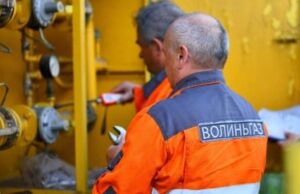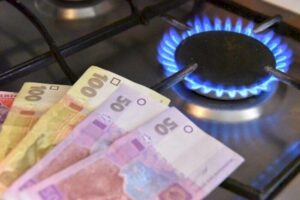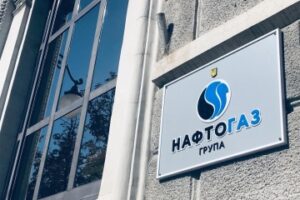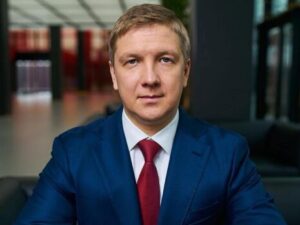
Volynhaz JSC has come under state control and joined the Naftogaz group,” the company said on Friday.
“This is the 17th regional gas distribution company that has come under state control since the beginning of the year. The changes were necessitated by the need to address strategic energy tasks concerning the reliable protection of critical facilities, as well as the speedy restoration of infrastructure in the event of enemy attacks,” the group said.
“Volynhaz” provides gas distribution to budget organizations and more than 250 thousand homes in the region.
“Tariffs for distribution services and personal accounts for residents of the region remain unchanged. On the change of requisites we will inform additionally”, – informed in “Naftogaz”
Earlier in the NJSC “Naftogaz of Ukraine” included JSC “Vinnytsiagaz”, JSC “Dniprogaz”, JSC “Dnipropetrovskgaz”, JSC “Donetskoblgaz”, JSC “Ivano-Frankivskgaz”, JSC “Zhytomyrgaz”, JSC “Kievoblgaz”, Krivorozhgaz, Kirovogradgaz, Lvovgaz, Mykolaivgaz, Sumygaz, Kharkovgorgaz, Kharkovgaz, Khmelnitskgaz and Cherkasygaz.

Ukraine is entering the autumn-winter season with a sufficient amount of gas in underground storage facilities, while maintaining a stable pricing policy, said Oleksiy Chernyshov, CEO of Naftogaz of Ukraine, during the United News telethon.
“Gas prices for households and district heating companies remain stable. They will not change until the end of winter. Therefore, I have to reassure the population in this regard, as well as cities and district heating companies,” he emphasized.
The Head of Naftogaz Group also noted that the preparations for the heating season were at the proper level.
“We have to move forward, get through this winter and be absolutely confident of victory and further actions,” Chernyshov said.
Earlier on Tuesday, Energy Minister Herman Halushchenko said that electricity prices for household consumers would remain stable until the end of this heating season.
“As for resources, we will be provided with everything we need, both coal and gas. Due to high temperatures in the last two months of summer, coal stocks in warehouses have fallen slightly, but we have already signed relevant contracts, including imports, and we will be fully provided with coal in the required volume,” the minister said.
According to him, almost 15 billion cubic meters of gas have been accumulated in storage facilities so far, which is even more than planned for the beginning of the heating season.

By the end of 2023, NJSC Naftogaz Ukrainy plans to complete the process of consolidating the gas distribution system operators that were managed by the Regional Gas Company of Dmytro Firtash.
“By the end of this year (we will complete the process,)” Oleksiy Chernyshov, head of the Naftogaz board, said in an interview with the Ekonomichna Pravda newspaper.
At the same time, he found it difficult to answer the question of how the debts to the GTS Operator of Ukraine of the regional gas companies transferred to the Naftogaz management will be repaid.
“I’m not ready to announce it before the process of integration of all regional gas companies is completed. We still need to figure out whose debts they are, who should be responsible for them, how they were created, and who should pay,” Chernyshov said.
As reported, at the end of May 2022, at the request of the State Bureau of Investigations (SBI), the court transferred the seized private corporate rights to 26 regional and city gas distribution system operators to the management of ARMA.

NJSC Naftogaz of Ukraine has refused to implement the UAH 1 billion project to build the first powerful biofuel CHP in Lviv that was launched when Yuri Vitrenko was in charge of the company, Lviv mayor Andriy Sadovoy said.
“Unfortunately, we have not found the support of “Naftogaz” in the implementation of this project, so now the process is suspended. We are directing all our energy, in particular, to the construction of a waste recycling plant,” he told Energoreform correspondent on the sidelines of the high-level meeting “Agreement of Mayors in Ukraine: Planning Sustainable Development Together” in Lviv on Wednesday.
At the same time, Sadovy noted that no money was allocated from the city budget for the CHP construction project. “It was an initiative of the former head of Naftogaz (Yuriy Vitrenko – ER), but today the management of the company has a different opinion regarding such projects in Ukraine,” the Lviv mayor explained.
At the same time, he pointed out that among other things there is a waste composting station in Lviv, and other eco-projects aimed at reducing CO2 emissions are implemented.
As Ukrainian News earlier reported, in September 2022, the Naftogaz of Ukraine jointly with the Lviv City Council launched a project to construct a combined heat and power plant on wood chips, which was planned to be put into operation by February 2023.
As Vitrenko said then, the cost of the project for the company will cost approximately UAH 1 billion.
Sadovaya, in turn, noted that for the city it will be the first powerful CHP plant on alternative fuel, which will cover about a quarter of its needs in heat. “We have planned such a project with the EBRD for a long time, but according to their classical procedures we could start it only next year. But Russian aggression has so activated the thought process that we came to agreements with Naftogaz,” he explained.
Similar projects were planned in other cities: under Vitrenko, Naftogaz announced its intention to build at least nine combined heat and power plants in eight regions of Ukraine with a total capacity of 250 MW of thermal energy and 52 MW of electrical energy.
According to Sadovyy, the construction of a waste processing plant in Lviv is planned to be completed by the end of this year. The works are 25% completed.
“Covenant of Mayors in Ukraine: planning sustainable development together” is the biggest movement in the world concerning climate and energy, which started in the European Union in 2008. Now the initiative unites 11 thousand local and regional authorities in 55 countries of the world. For today almost 300 Ukrainian communities have joined the climate movement. They have developed 180 action plans aimed at solving energy and climate problems. Signatories of the agreement in Ukraine have pledged to reduce CO2 emissions by more than 25 million tons per year.

Naftogaz group has paid more than UAH 30 billion of taxes to the state budget of Ukraine in the four months of 2023, which is 15% of all tax revenues to it during this time.
According to a report on the group’s website on Monday, Naftogaz Group paid a total of nearly 33 billion hryvnias to the state and local budgets as of May 1, 2023.
“Despite the war and the consequences it caused, Naftogaz Group remains one of the largest taxpayers in Ukraine and a reliable support for the treasury. Only in April we accumulated 6.2 billion UAH of taxes, which is almost 13% of all tax revenues of the state budget of the country”, – Chairman of the Board of Naftogaz of Ukraine Alexei Chernyshov was quoted in the message.
As Ukrainian News earlier reported, Ukrhazvydobuvannia (UHV), 100% owned by Naftohaz Ukrainy, transferred UAH 6.32 billion of rent payments to the country’s consolidated budget based on its activities in January-March 2023.

The Supreme Anti-Corruption Court has supplemented the preventive measure for the former head of Naftogaz Andrey Kobolev by wearing an electronic bracelet, the bail in the amount of 229.248 million UAH remains in force, the VAKS said.
“VAKS supplemented the main measure of restraint issued by the appellate chamber of VAKS with the need to wear an electronic bracelet,” the court told the Interfax-Ukraine news agency on Tuesday.
Earlier, the Appellate Chamber VAKS partially granted the petition, applying to the former head of the Naftogaz board a preventive measure in the form of bail in the amount of 229.248 million hryvnia. Also, the suspect was subject to the following obligations: to come to the detective, prosecutor and court at each request, not to leave Kiev without the permission of the detective, prosecutor or court, to inform the prosecutor, detective or court on change of his place of residence, to refrain from communication with other suspects in the case and witnesses, to deposit passport (passport) for traveling abroad with the appropriate authority.
According to the court ruling, the suspect had to deposit the funds within 5 days from the date of pronouncement of the decision.
On March 7, Kobolev was bailed out in the amount of 96 million 635 thousand UAH, which was not an obligation, since the funds were not received in full and not within the period specified by the court.
On March 8, the prosecutor asked the court to change the preventive measure for Kobolev – to keep him in custody with the alternative of making 365 million UAH, but not 229 million UAH, as it was before.
On January 19, 2023, the SAP and the NABU notified Kobolev of their suspicion of abuse of office in securing the payment of UAH 229 million in bonuses for his victory in the Stockholm arbitration with the Russian Gazprom. According to the investigation, this amount significantly exceeds the normatively determined amounts of such payments (37.48m hryvnyas).